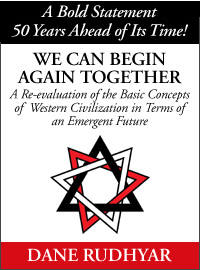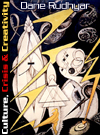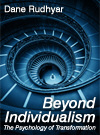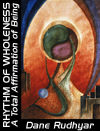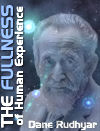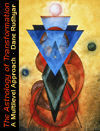We Can Begin Again Together
by Dane Rudhyar
Introduction
Twenty-five years ago, a few weeks after the atomic bomb fell over Hiroshima, I started to write a book which I had titled New Goals. It was published in the spring 1948 by the Philosophical Library in New York, but the publisher insisted on using a new title, Modern Manís Conflicts. The subtitle, "The Creative Challenge of a Global Society," stated more adequately the purpose I had in mind in writing this book, which has been out of print for over fifteen years.
Much has happened since the writing was completed in 1946 and quite a few of the ideas which were presented then had to be reformulated to fit the new social and international situation — one which has so tragically deteriorated just because what I had hoped for at both the personal-psychological and the social-political levels proved to be impossible. The compelling pressure of rigid traditions, and the weight of the accumulated failures produced by individual and collective greed, pride, arrogance, fear, egocentricity and mental stupidity frustrated any attempt at producing the condition of bipolar harmony which I had envisioned as an all-inclusive ideal.
Everybody — individuals and nations — had conflicts, as my publisher emphasized; but hardly anyone was able to see that these conflicting opposites could be harmonized. Now the polarization of nations and social groups has taken a more complex and more violent form. Explosives are far more powerful than during World War II. Individual human beings are coerced more widely and more decisively throughout the world by technocrats of various types in control of the tremendous powers released by our technology, and the planet as a whole is being poisoned by the waste-products of our truly insane lust for always greater production and consumption.
Yet new and striking developments have occurred. They rouse hope, but a tragic hope indeed; for the fulfillment of this hope is almost inconceivable, short of some miraculous "intervention" from supernormal or extra-planetary Powers, until mankind experiences a most radical and world-wide crisis, the immediate outcome and duration of which can hardly be foreseen.
In 1946, in the wake of a terrible global war, there appeared to be hope that somehow mankind might move peacefully toward the "New Age" of which seers and enthusiasts were dreaming. The suffering and wholesale tragedy seemed enough to shock peoples and nations into reassessing the value of their past traditions, cultures, religions, and their political-economic institutions, and, finding them irrelevant in our contemporary world, into deliberately and radically transforming them. The momentum of collective patterns of mind and feeling was far too powerful; individuals and nations were too fearful, too proud, too possessive, too greedy, too insecure and too neurotic. It seems now that there is not much hope of effecting a relatively smooth and peaceful transformation of both social-political institutions and, at the individual level, of egocentric and intellectualistic structures. Violence on either side has generated more violence. At every level — personal, national, international — a crisis-psychology dominates feelings and thoughts as well as behavior.
The only hope is that a rather amazing new generation of "below thirty" youth might retain its idealism, its yearning for "love" as an effectual force in all forms of interpersonal and social relationships and, as it grows up, somehow manage to gain the initiative and learn the practical know-how to transform our society. But will there be time? Will the confused youngsters of today be able to make their potential power effective against entrenched bureaucracies and political, military and business interests? Will their attempts — granted there are such — be well enough organized, clear-headed, daring, to meet the resistance of the men who now hold frightening power and who assuredly will not give up or die so easily?
If they do not succeed — these youths who have also been experiencing a crisis-psychology and sought drugs to release them from constricting mental-emotional patterns — then, this will mean that a wholesale global tragedy is inevitable, sooner or later — presumably very soon, this century.
If so, why write, then?
Because if, when the winter storms and icy blasts strike, there are no seeds hidden within the decaying leaves of the past vegetation, there will be no new vegetation, come springtime. There are ideas which are like seeds, for in them the potentiality of a new life-cycle is condensed. These ideas must be formulated tersely, vividly, convincingly, by minds that are the end-products of a closing cycle of civilization. They are concentrates of human experiences, and if they have within them the mysterious power of evolutionary mutations, they act as alchemical retorts in which the failures of the past are transformed into living and healing gold. From them at least a few individuals will see arising new hope, a new vision, a new faith in the triumph of harmony over discords, a new determination to work out more inclusive forms of integration victorious over the inertia of obsolete social and cultural institutions.
Ideas that are truly living seed of mind can become words of power, mantrams to unify the feelings-response of future-oriented groups and perhaps of bewildered and confused multitudes. They ensoul new symbols; and every culture, every society has at its core a few symbols, a few great Images. Men's minds and souls are formed in their likeness, because through these symbols basic human needs can be met and the karma of ancient failures can be neutralized by appropriate acts of courage, of creation, and of sacrificial love.
Seed ideas — I have sought all through my now long life to evoke them and give to their transforming power a new embodiment. But it takes a long time for the seed to fully mature within the slowly decaying fruit of a plant whose annual cycle of existence is nearing its end. Then the mature seed is released and falls into the autumnal soil.
Here, however, the seed analogy breaks down, because the released seed-idea may somehow begin a contagious process; or, to change the symbolism, it begins to act as a small crystal which, when it falls into a ready chemical solution, starts a rapid process of crystallization. What was loose and unstructured acquires form, a form which repeats and immensely multiplies that of the seed-crystal. Indeed a mysterious power inheres in a strongly formulated statement of "order"; for order will always win over chaos IF this order is pregnant with futurity and a reflection of great archetypes of evolutionary growth — if it is not the fallacious and neurotic kind of "law and order" which seeks to re-emphasize or restore social rules and collective beliefs no longer in tune with the evolutionary tide relentlessly moving forward in terms of some vast planetary or cosmic cycle.
The formulation of a new type of order has inevitably to occur in the midst of a society which still clings to obsolescent, if not entirely obsolete, modes of behavior, of feeling and thinking. Because of this simple fact the formulation must challenge some of the perhaps most cherished beliefs of a society which may have either misunderstood their original meaning and sphere of application, or misapplied them, or whose everyday behavior may constitute a constant lie to what it officially proclaims to be its beliefs and purposes. It may also simply be that this society constitutes only a transition between two stages of human existence, referring to two different levels of consciousness, and that the period of transition is now over. The concepts and modes of behavior which belonged quite significantly and validly to this period have now to be radically revised, revaluated, and transformed in order to allow those of the higher level to become exteriorized in the very substance of interpersonal and social relationships.
There may be some truth in every one of these possible interpretations; and we shall try to find out in the first part of this book what are the main obstacles our present Western society and its civilization present to a realization in depth of new potentialities of human development.
In the second part I shall offer what I consider to be basic principles and guidelines necessary for the establishment of a truly new order. The Great Seal of the United States carries on its highly symbolic, occult, and Masonic reverse side the words: "A new order of the centuries" (Novus ordo seclorum); and, indeed, great changes have been brought to Western society by "the American experiment." But this experiment was blighted at its very beginning with the dark shadow of European culture and religion, and with the added tragic burden of slavery.
Has the American experiment failed — or was it inevitable that it should turn out to represent only a period in the transitional phase between two basic stages in human evolution? This phase actually can be divided into two periods: the European period until the Renaissance and, beginning with the sixteenth century, the Euro-American period — or perhaps we should say the Atlantic period, for its development was centered around the Atlantic Ocean, just as at first Western civilization had developed around the Mediterranean Sea.
What seems now inevitable is the emergence of a global society which will include, organize, and inspire the whole of mankind. It is the achievement of such a global society which can give to the twenty-five centuries of our Western society its basic and constructive meaning. It represents not only a phase of transition, but the prelude to what is yet to come. In this prelude some of the great themes of the future world-order have already been sounded, but they have been distorted by the inertia of past institutions and the necessity of dealing with rough and aggressive races, especially the Germanic and Nordic, which perverted the universalistic love of the Christ spirit, a spirit already contaminated by the Hebraic ghosts clouding the personality of the great promoter, Paul.
We have idealized in America some of these negative aspects of the European culture which in turn inherited many unwholesome traits and fallacies from the Greco-Latin mentality and equally pernicious emotional attitudes related to the deep-rooted sense of guilt and failure inherent in the Hebraic tradition. At the potential beginning of the global planetary era of man's evolution all these negative features have to be faced, understood, accepted, and totally transmuted. This, however, can only be done if we can hold very clearly in our mind at least the outlines of a vision of the possible future of humanity.
There are many intellectuals who seek to picture for us a technological future based on extrapolations and computer models of present scientific trends. This is not the kind which I have envisioned. The future I shall tentatively present no longer belongs to the European-American transition period of which I have spoken above. It constitutes truly a "New Order," and not an extension and prolongation of the European type of social and religious-ethical consciousness. Nevertheless, it is essentially and, in the deepest sense of the term, a substantiation of the love-principle and the universalistic, unpossessive, unaggressive, and spiritually free ideal of the Christ-life — and therefore, as well, of the spiritual ideals which illumine the doctrines of all great religions when reduced to their essentials. But these essentials have now to be given a truly realistic and concrete character in terms of a harmonic and functional kind of social organization which gives to the "individual" and the "collective" poles of human existence their true meaning — true because interpenetrating and cooperative. And the key-factor in this New Order of society and humanity is the group or the commune.
What I mean by a real commune and, at this time of accelerated and dangerous readjustment and transition, a seed-group will be discussed in the third part of this book. Also discussed will be a threefold approach to what is now confusingly called "education."
This is not a book for specialists or scholars attached to their institutionalized and over-intellectual frames of reference. It is a statement of faith in Man and the power for transformation and growth inherent in evolution here on this beautiful and so tragically misused Earth. It makes its appeal both to the critical mind, when the past is discussed, and to the imaginative vision of the seer, when the potentiality for a future of world-harmony is spelled out. It also addresses itself to what in man is courage, and enduring strength, as well as deep serenity and universal love, for without these human qualities nothing of creative value can be achieved. The end of the road is, I believe, haloed with the light of a truly new and radiant era; but the road may be long, and indeed, in some places at least, tragic. Men and women of courage, of peace, and of unpossessive love are needed to walk on that road. May what is written in this book stimulate in them not only more faith in the future of man, but a clearer realization of how the great dream can slowly become reality!
1. The Achievements and Failures of Western Society
Copyright © 1974 by Dane Rudhyar.
All Rights Reserved.
See Notices for full copyright statement and conditions of use.
Web design copyright © 2000-2004 by Michael R. Meyer.
All Rights Reserved.


